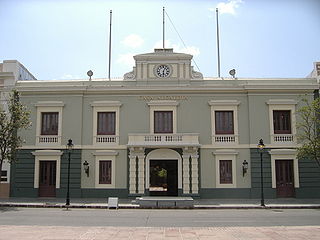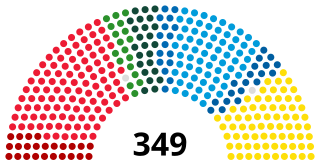
A constitution is the aggregate of fundamental principles or established precedents that constitute the legal basis of a polity, organization or other type of entity, and commonly determines how that entity is to be governed.
A head of state is the public persona of a state or sovereign state. The specific naming of the head of state depends on the country's form of government and separation of powers; the head of state may be a ceremonial figurehead or concurrently the head of government and more.

A municipality is usually a single administrative division having corporate status and powers of self-government or jurisdiction as granted by national and regional laws to which it is subordinate.

The Basic Laws of Sweden are the four constitutional laws of the Kingdom of Sweden that regulate the Swedish political system, acting in a similar manner to the constitutions of most countries.

The Riksdag is the legislature and the supreme decision-making body of the Kingdom of Sweden. Since 1971, the Riksdag has been a unicameral legislature with 349 members, elected proportionally and serving, since 1994, fixed four-year terms. The 2022 Swedish general election is the most recent general election.

The monarchy of Sweden is centred on the monarchical head of state of Sweden, by law a constitutional and hereditary monarchy with a parliamentary system. There have been kings in what now is the Kingdom of Sweden for more than a millennium. Originally an elective monarchy, it became a hereditary monarchy in the 16th century during the reign of Gustav Vasa, though virtually all monarchs before that belonged to a limited and small number of political families which are considered to be the royal dynasties of Sweden.
The Council of the Realm, or simply The Council, was a cabinet of medieval origin, consisting of magnates which advised, and at times co-ruled with, the King of Sweden.
Promulgation is the formal proclamation or the declaration that a new statutory or administrative law is enacted after its final approval. In some jurisdictions, this additional step is necessary before the law can take effect.

The 1810 Act of Succession is one of four Fundamental Laws of the Realm and thus forms part of the Swedish Constitution. The Act regulates the line of succession to the Swedish throne and the conditions which eligible members of the Swedish royal family must abide by in order to remain in it.

The 1809 Instrument of Government, adopted on 6 June 1809 by the Riksdag of the Estates and King Charles XIII, was the constitution of the Kingdom of Sweden from 1809 to the end of 1974. It came about as a result of the Coup of 1809, in which King Gustav IV Adolf was deposed. The promulgation of the constitution marks the point at which Sweden transitioned from the absolute monarchy of the Gustavian era into a stable, constitutional monarchy adhering to the rule of law and significant civil liberties.

Sweden and Norway or Sweden–Norway, officially the United Kingdoms of Sweden and Norway, and known as the United Kingdoms, was a personal union of the separate kingdoms of Sweden and Norway under a common monarch and common foreign policy that lasted from 1814 until its peaceful dissolution in 1905.

A commander-in-chief or supreme commander is the person who exercises supreme command and control over an armed force or a military branch. As a technical term, it refers to military competencies that reside in a country's executive leadership, a head of state, head of government, or other designated government official.

The 1772 Instrument of Government was the constitution of the Kingdom of Sweden from 1772 to 1809. It was promulgated in the wake of the Revolution of 1772, a self-coup mounted by King Gustav III, and replaced the 1720 Instrument of Government, which had been in force for most of the Age of Liberty (1719-72). Although in theory the 1772 Instrument merely readjusted the balance of power between the Crown and the Riksdag of the Estates, without changing Sweden's status as a constitutional monarchy, in practice it is generally seen as instituting an absolute monarchy, especially after its modification in 1789 by the Union and Security Act, which further strengthened royal power at the expense of the Riksdag. It remained in force throughout the Gustavian era, until replaced by the 1809 Instrument of Government as a result of the Coup of 1809.
The King-in-Council or the Queen-in-Council, depending on the gender of the reigning monarch, is a constitutional term in a number of states. In a general sense, it refers to the monarch exercising executive authority, usually in the form of approving orders, on the advice of the country's privy council or executive council.

The deputy prime minister of Sweden is the deputy head of government of Sweden. The incumbent deputy prime minister is Ebba Busch.

Judicial review in Sweden is a constitutional provision, by which any Swedish court or administrative authority can declare an Act of the Parliament of Sweden to be in violation of the Constitution or a Government Ordinance to be in violation of laws passed by the Riksdag and thus inapplicable in the concrete case. Since 1994, the Constitution has stipulated that no law or other regulation may violate the European Convention. Traditionally, a more important check on the ability of the Riksdag to pass laws in violation of the rights provided by the Constitution has been the judicial preview exercised by the Council on Legislation. The preview may or may not be respected by the legislator.
An uncodified constitution is a type of constitution where the fundamental rules often take the form of customs, usage, precedent and a variety of statutes and legal instruments. An explicit understanding of such a constitution can be developed through in commentary by the judiciary, government committees or legal experts. In such a constitutional system, all these elements may be recognized by courts, legislators and the bureaucracy as binding upon government and limiting its powers. Such a framework is sometimes imprecisely called an "unwritten constitution"; however, all the elements of an uncodified constitution are typically written down in a variety of official documents, though not codified in a single document. However, there may be truly "unwritten" constitutional conventions which while not usually legally enforceable may hold just as much sway as the letter of the law.

Events from the year 1809 in Sweden

The Coup of 1809 also referred to as the Revolution of 1809 was a Swedish coup d'état 13 March that year by a group of noblemen led by Georg Adlersparre, with support from the Western Army. The coup resulted in the deposition of King Gustav IV Adolf and the introduction of a new Instrument of Government. The coup was provoked by the disastrous Finnish War. The leaders of the coup are known in history collectively as 1809 års män.

The FreedomofthePressAct is one of four Fundamental Laws of the Realm and thus forms part of the Swedish Constitution. The Act regulates matters regarding freedom of press and principle of public access to official records. The Freedom of the Press Act as well as the Fundamental Law on Freedom of Expression is one of the two "basic media acts" in Sweden. The Freedom of the Press Act is derived from the Freedom of the Press Act of 1766; the legislation is regarded as the world's first law supporting the freedom of the press and freedom of information.









